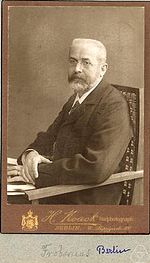Ferdinand Georg Frobenius
Ferdinand Georg Frobenius was a German mathematician, best known for his contributions to the theory of elliptic functions, differential equations and to group theory. He is known for the famous determinantal identities, known as FrobeniusStickelberger formulae, governing elliptic functions, and for developing the theory of biquadratic forms. He was also the first to introduce the notion of rational approximations of functions , and gave the first full proof for the CayleyHamilton theorem. He also lent his name to certain differentialgeometric objects in modern mathematical physics, known as Frobenius manifolds.
Ferdinand Georg Frobenius was born onOctober 1849 in Charlottenburg, a suburb of Berlin from parents Christian Ferdinand Frobenius, a Protestant parson, and Christine Elizabeth Friedrich. He entered the Joachimsthal Gymnasium in 1860 when he was nearly eleven. In 1867, after graduating, he went to the University of Gttingen where he began his university studies but he only studied there for one semester before returning to Berlin, where he attended lectures by Kronecker, Kummer and Karl Weierstrass. He received his doctorate in 1870 supervised by Weierstrass. His thesis, supervised by Weierstrass, was on the solution of differential equations. In 1874, after having taught at secondary school level first at the Joachimsthal Gymnasium then at the Sophienrealschule, he was appointed to the University of Berlin as an extraordinary professor of mathematics. Frobenius was only in Berlin a year before he went to Zrich to take up an appointment as an ordinary professor at the Eidgenssisch
Source: Wikipedia

